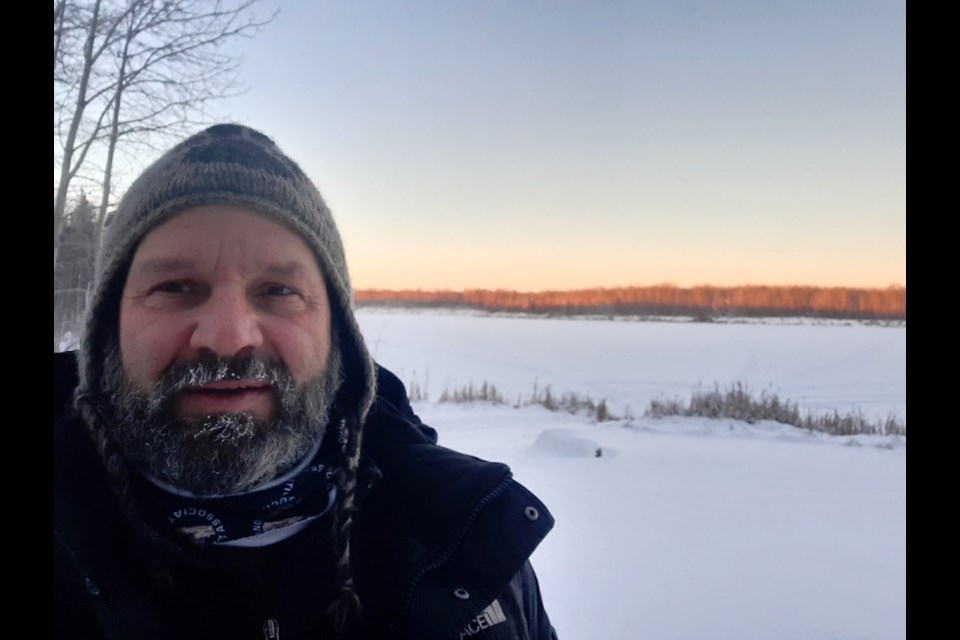WESTLOCK – For a generation, Perry Kulmatyski was one of the faces of R.F. Staples School.
Hired in 1994 following a five-year teaching stint at Victoria Composite High School in Edmonton, the Barrhead native quickly found a home in the halls of RFS and was well-known for his trademark smile, quick wit and boundless enthusiasm.
“It was such a great move for my family. We loved coming to a smaller town,” he recalled during a pre-Christmas interview.
Although a Math 30 teacher by trade, Kulmatyski would also teach phys-ed and a wellness class over the years, plus also spent countless hours coaching the senior girls volleyball team and served as the school’s associate principal for the last half-dozen years.
And then of course there was the annual spring bike trip from Jasper to Banff, an event he ran at Vic for four years and continued at RFS for another 21 until the final ride in 2017. The 290-kilometre trek that included Kulmatyski, select Grade 12 students and always a few parents was his signature creation, an event that allowed kids “to reflect and grow.”
So, if there was ever a guy meant for the classroom, it was Kulmatyski.
But then COVID-19 hit, making 2020 and 2021 some of the “most challenging years” he’s faced as an educator.
Throw in the closure of the Alberta Distance Learning Centre in Barrhead last summer, which meant a lot of young teachers at RFS were getting their walking papers and Kulmatyski came to the realization that his “tank was kind of empty and maybe it was time.”
“It was the hardest decision bar none that I’ve ever made in my life. Throughout 25 years of bike trips I always told the kids to never quit on the hills … do you know what I mean? I had an internal battle the whole year and there was no middle ground,” he said.
When he tendered his walking papers and walked out of RFS for the last time as a full-time staffer last summer it was the first time he had been unemployed in more than three decades.
“I was passionate about teaching, always. So, if I wasn’t going to do it, then what was I going to do?” he asked.
He knew he wanted to do more cycling and thought about “maybe pulling a Chuck Keller” and going to work for the town in the recreation department — Keller, whose name adorns Keller Field, is cited as one of community’s biggest sports boosters and was previously vice-principal at Westlock Elementary School. Kulmatyski, whose children have long since moved out of the house, even considered driving schoolbus or big rig and also contemplated a principal job in Dawson City, Yukon before his wife Shelia, who still works at RFS as its business manager, began reading off an ad.
“Do you like spending time outdoors? Do you enjoy sharing the outdoors with other people? Would you like every day to be different? Do you want to share wildlife stewardship with youth and students?”
“What is this? Is this a job?” he recalls saying to Shelia.
What it ended up being was his “next adventure” with the Alberta Trappers Association as the program development officer for the newly-minted Alberta Centre for Trapping and Bushcraft.
Kulmatyski recalls sitting down for a 30-minute job interview with ATA community liaison/program development head ATA Ross Hinter to talk about the gig. The interview ended up lasting three hours as both men were big fans of Mors Kochanski, a famed Canadian bushcraft and wilderness survival instructor, naturalist and author. During the 1970s Kochanski became an associate professor at the University of Alberta Faculty of physical education, editor of Alberta Wilderness Arts and Recreation magazine, and a freelancer for various agencies. In 1986, he wrote a book on survival and wilderness skills for the boreal forests, which was originally titled Northern Bushcraft and later shortened to just Bushcraft — it was a book both Kulmatyski and Hinter loved.
Call it karma, or fate, but all the pieces came together at the right time.
Ultimately Kulmatyski, who’s been a life-long outdoorsman and a hunter, jumped at the chance, especially considering he’ll be able to continue teaching in an all-natural setting. The centre, which officially opened Sept. 11 and is located at the Teen Time Ranch roughly about 50 kilometres northeast of Westlock, is focused on education and offers several professional development courses and programs, including a standard trapping course, trapping workshops, bushcraft and wilderness workshops and, near and dear to Kulmatyski, youth programs.
He’s jumped in with both feet and taken several trapping courses “to make sure my hands don’t get caught in some of the traps,” he added with a chuckle.
Kulmatyski stresses they’re “proud of trapping and its important history” and trapping is the reason the centre exists. But he’s hopeful that it will also be a place to teach youth about the outdoors and allow them to “disconnect” from their cellphones and “slow down and be more connected to what’s around them” and truly experience nature. He still loves teaching and continues to sub at RFS and St. Mary School.
“Education plays a big role in explaining the stewardship that is in involved in trapping and Ross has a vision of what he wants to accomplish there. There are so many cool ideas,” he continued. “But we have a generation of youth more challenged in terms of wellness in a variety of ways. Kids are hurting, they really are and that’s not just in Westlock, it’s across the board.
“We’ve never had a generation that doesn’t really just play and go outside or build a treehouse. And if in some way we can expose more kids to the wilderness — have them put on some snowshoes, go for a wiener roast and do a bushcraft skill — then I think that’ll be a good thing.”



